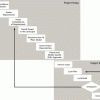Strategic advice to leverage new technologies
Technology is at the heart of nearly every enterprise, enabling new business models and strategies, and serving as the catalyst to industry convergence. Leveraging the right technology can improve business outcomes, providing intelligence and insights that help you make more informed and accurate decisions. From finding patterns in data through data science, to curating relevant insights with data analytics, to the predictive abilities and innumerable applications of AI, to solving challenging business problems with ML, NLP, and knowledge graphs, technology has brought decision-making to a more intelligent level. Keep pace with the technology trends, opportunities, applications, and real-world use cases that will move your organization closer to its transformation and business goals.
Recently Published
Ken Olsen: Remembering a Pioneer
Agile Estimation: Dealing with the Unknowns
Software estimation is still a gray area despite lots of research material, articles, and books. Some consider estimation an art; some a science. Others consider it both. Agile estimation has been no exception, and there is high level of debate about the ways in which it is done. Questions have been raised about the lack of scientific evidence as well as application in real-life projects and challenging scenarios.
Last October, I discussed in an Advisor developing trends pertaining to social media monitoring and analysis (see "Psst ... Listen in as Some Business Tune in to Social Media," 5 October 2010).
In designing and documenting architectures, be they business, data, application, or technology architectures, enterprise architects are prone to focus first and foremost on the objects that compose the architecture in question. This is both human nature (nouns before verbs) and a logical approach to design. For example:
Back in December, when I offered predictions concerning important BI trends I saw for the New Year, I said that adoption of data mining and predictive analytics would experience steady growth in 2011, just as it has over the past 10 years or so (see "What Lie
What Is the Adaptive Project Framework -- Really?
The Adaptive Project Framework (APF) is an umbrella framework that encompasses all project management methodologies. APF has two distinct parts. In the project setup, a decision is made as to what is the best-fit management methodology and how it needs to be adapted for the project at hand.
What Is the Adaptive Project Framework -- Really?
The accompanying Executive Report establishes the Adaptive Project Framework (APF) as an umbrella framework that encompasses all project management methodologies.












